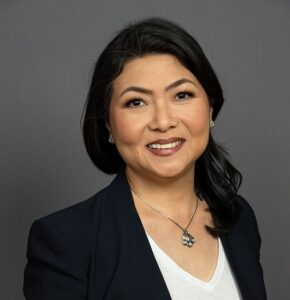Breaking the Glass Ceiling – An interview with Julie Teh SVP Finance for Digital Transformation at Estee Lauder Companies
When Julie Teh isn’t chiming with her Gen Z twin daughters on hits from Taylor Swift and Miley Cyrus, or mentoring women and girls around the world, she’s deep in the weeds of transforming Estee Lauder’s finance function. As Senior Vice President, Finance Digital Transformation, she leads the company’s enterprise-wide efforts to harness their vast amount of customer data into actionable insights.
Lauder’s finance function. As Senior Vice President, Finance Digital Transformation, she leads the company’s enterprise-wide efforts to harness their vast amount of customer data into actionable insights.
While it might sound like it, leading the digital finance transformation agenda at Estee Lauder isn’t just a technology job, she says. “At the core it’s about the way we do business. It’s about leveraging data to improve our decision making – making us smarter. It’s about how we create and extract data useful to our corporation. It’s also about improving processes that cut across the entire enterprise.” “Ultimately,” she adds, “as a finance executive all these initiatives lead you to work with other functional heads. So you need to have the business partnering skills to cross your own functional line.”
While she just moved into her current SVP role in 2023, for the past twenty years Julie has travelled the world in a variety of senior finance positions. At Estee Lauder specifically, “this is my third job”, she says. Previously, Julie held the positions of VP Finance and Strategy for Clinique Global Brand, and as the Global Lead for Value Creation.
“What’s made my experience here special, is that it still has family ties,” she says. “Estee Lauder is a public company that maintains a personal touch. I’ve partnered at Clinique with Jane Lauder, who is the granddaughter of the founder. It’s a totally different vibe when you’re working with someone who’s had a vested interest in your company for generations.”
The core of finance and the evolving role of the CFO
In her long career in Finance and Supply Chain, Julie has lived in many of the world’s major cities and experienced many different business cultures. However, one thing remains the same when it comes to businesses everywhere, she explains. “The core of the finance role doesn’t change. CFOs have to be ready to respond quickly when risks happen and be able to bring the organization together through communication and leadership. They need to galvanize cross-functional teams and bring clarity to both the macro and micro issues their company is facing.”
As a former CFO of Unilever Canada, CFO of Unilever Malaysia & Singapore, and CFO for Motorola Philippines, Julie is also well positioned to understand how the role of the CFO has changed over time. “Because of the evolving complexity of technology, it’s become inevitable for CFOs to be technologists as well. We can’t just delegate IT anymore. We need to understand what technology can do and what the prerequisites are for us to be able to apply it to the company’s advantage.”
As to how she chose financial management as a career, “it helps if you have a mind for mathematics and systemic thinking,” she says. “Finance is also the one function in business that allows you to have a broad impact on decision making, and that appealed to me.”
Early on Julie’s propensity for numbers would lead her to participate in inter-school Math Olympics, then graduate Magna Cum Laude in Accounting at Del La Salle University and rank second in the CPA Board Exams. However, despite her natural talents, breaking through the glass ceiling in finance wasn’t always easy, she explains. “At Unilever I was the first woman to reach the top finance job, and that’s a source of pride for me. But it also speaks to how challenging the world of finance can be for women. It’s been a very male dominated profession.”
“It’s ironic,” she adds, “because women are uniquely suited for the corner finance office today.“ Women are good at crossing functional lines, she says, because by nature they think of the team and the implications of business decisions on the team. “Because of that, we’re naturally positioned for horizontal leadership and that’s a strength that we should leverage.”
For women in the field who aspire to a top finance job, Julie offers the following tips:
Tip1: Be ready to understand technology. I’m not talking about coding, but understand the business case, the ROI, and if your business is ready for it.
Tip 2: There are classic characteristics of the top finance job that won’t go away – your executive presence. In other words, how you show up and how you communicate a business issue continues to be an important part of how people evaluate you.
Tip 3: When it comes to change, it’s not just about managing upwards, it’s making sure that you’re connected to the more junior team members who are digital natives and an inspiration for transformation. Keep in touch with as many of the different demographics in the company as possible, even outside of your function.
Tip 4: Be curious and never stop learning. Make learning your DNA. Seventy percent of employees today prefer skills-focused companies.
Tip 5: Know your business very well. Full stop.
Tip 6: Women aren’t as focused on networking as they should be. Networking is an essential part of growth and development. Make external connections and find a mentor/be a mentor.
Tip 7: Try to be a balanced and interesting person. Know when to switch off. You need to have time for your family. You need to have time for yourself. You need to have time to discover the world around as that’s what makes you an interesting person to work with.
Now residing in New York city with her husband, twin Gen Z daughters and two disabled rescue dogs, Julie spends her valuable spare time as a volunteer mentor for the Aspire Foundation which aims to empower women and girls world-wide.





Julie is amazing colleague. She guides you and makes you feel included. She is also very conscientious of the environment. A very important trait for today’s leadership that most people only offer lip service.
Amazing career journey, Julie! You were clearly much ahead of your time! All the 7 tips are useful for every aspiring finance leaders, irrespective of gender! You truly lived them. Proud to have worked with you during the Unilever days.
Congratulations, Jules! 👏👏👏👏👏 Animo La Salle!
Great work Julie ! So proud of you
An exemplary person to highlight this women’s history month! She has broke through many barriers, and I am inspired by her career journey. It was insightful to read Julie’s advice, especially as I just started my finance career.
Your achievements in finance and dedication to mentoring women are inspiring. It’s great to see someone balance professional success and personal passions so well. Keep leading the way!
Congratulations Julie!!!
So proud of you!!!
Even though most companies have made significant strides in diversity, it’s rare to see an Asian woman in the C-suite. This interview really highlights her qualifications and experiences, and implementing her tips will help women and other minorities succeed in their careers.
Excellent article. Very useful to every up and coming woman. The bottom-line is very important for everyone, whether in technical leadership or financial area to understand.
Thanks for sharing.
I have the privilege to work with Julie, she is a great leader, an expert in the Finance domain, and continuously seeks to learn how technology can help advance the function in the digital transformation journey. She works with team members across different areas and clearly articulates her vision and approach.
As we all know, transformations are not easy, however, Julie collaborates across the teams to help them see the impact and how it will help the organization.